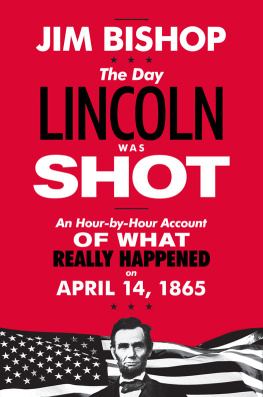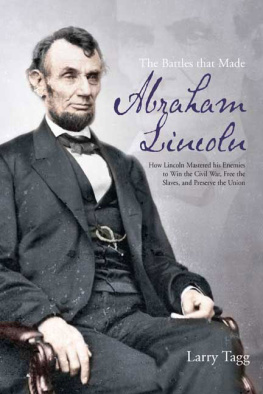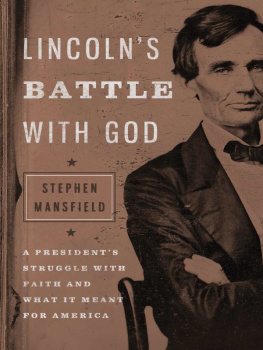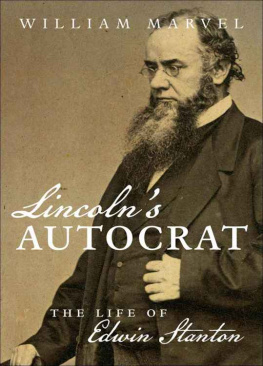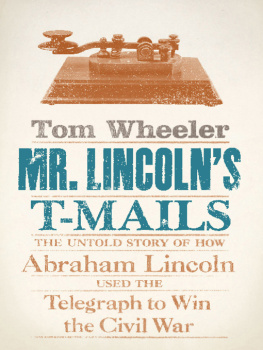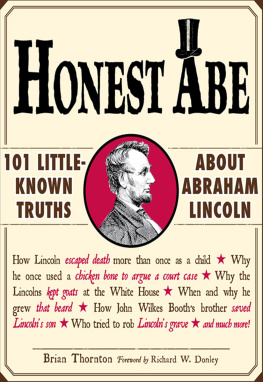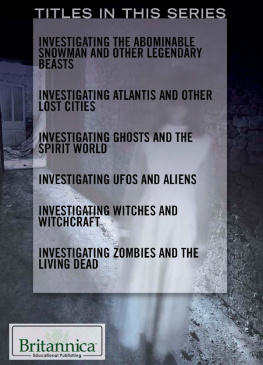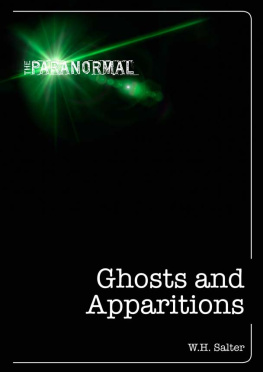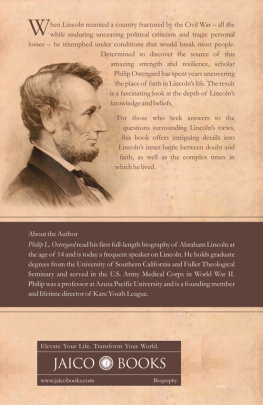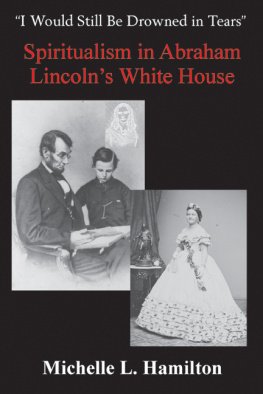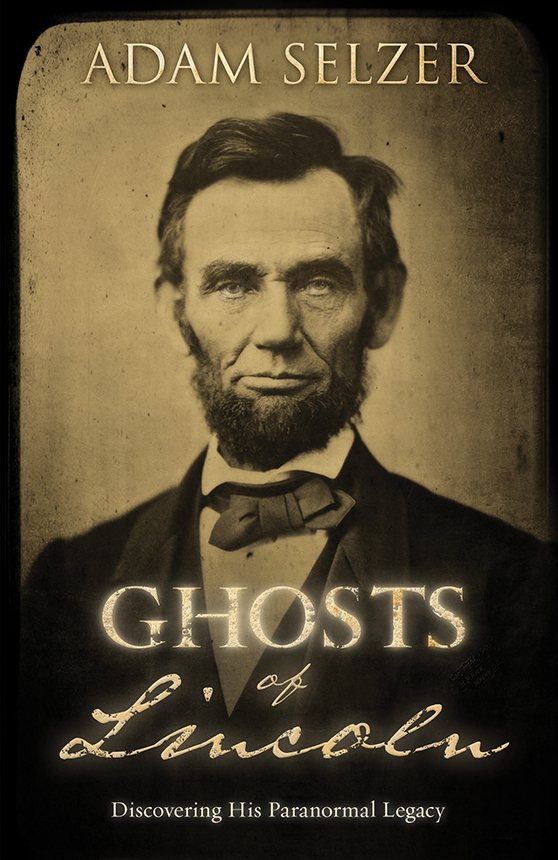Adam Selzer is the author of more than a dozen books, including several novels and the acclaimed Smart Alecks Guide to American History. While doing research for stories to tell on the ghost tours that hes run in Chicago for nearly a decade, he developed a knack for discovering new clues to old mysteries. With his trademark smart-alecky humor, hes applied himself to wading through mountains of death certificates, poring through reels and reels of newspaper archives, and occasionally sticking his head right into crumbling old tombs. He lives with his wife in a small Chicago apartment where the cats have them outnumbered and know it.

Llewellyn Publications
Woodbury, Minnesota
Copyright Information
Ghosts of Lincoln: Discovering His Paranormal Legacy 2015 by Adam Selzer.
All rights reserved. No part of this book may be used or reproduced in any matter whatsoever, including Internet usage, without written permission from Llewellyn Publications, except in the form of brief quotations embodied in critical articles and reviews.
As the purchaser of this e-book, you are granted the non-exclusive, non-transferable right to access and read the text of this e-book on screen. The text may not be otherwise reproduced, transmitted, downloaded, or recorded on any other storage device in any form or by any means.
Any unauthorized usage of the text without express written permission of the publisher is a violation of the authors copyright and is illegal and punishable by law.
First e-book edition 2015
E-book ISBN: 9780738745145
Book design by Bob Gaul
Cover image courtesy Library of Congress/LC-DIG-ppmsca-19301/
original photo Alexander Gardner
Cover design by Lisa Novak
Editing by Ed Day
Interior photos courtesy Library of Congress except Lincoln Piano on
Adam Selzer, Mumler on College of Psychic Studies in
London and Lincoln Bedroom on John F. Kennedy Presidential
Library and Museum in Boston
Llewellyn Publications is an imprint of Llewellyn Worldwide Ltd.
Library of Congress Cataloging-in-Publication Data
Selzer, Adam.
Ghosts of Lincoln : discovering his paranormal legacy / Adam Selzer. -- FIRST EDITION.
1 online resource.
Includes bibliographical references.
Description based on print version record and CIP data provided by publisher; resource not viewed.
ISBN 978-0-7387-4514-5 -- ISBN 978-0-7387-4153-6 1. Lincoln, Abraham, 1809-1865--Psychology. 2. Spiritualism--United States--History--19th century. 3. Parapsychology--United States--History--19th century. 4. Ghosts--United States. I. Title.
E457.2
973.7092--dc23
2015015968
Llewellyn Publications does not participate in, endorse, or have any authority or responsibility concerning private business arrangements between our authors and the public.
Any Internet references contained in this work are current at publication time, but the publisher cannot guarantee that a specific reference will continue or be maintained. Please refer to the publishers website for links to current author websites.
Llewellyn Publications
Llewellyn Worldwide Ltd.
2143 Wooddale Drive
Woodbury, MN 55125
www.llewellyn.com
Manufactured in the United States of America
Contents
: A World of Superstition
: Early Premonitions
: A World of Death: Growing Violence and the Rise of Spiritualism
: Lincolns Piano Ride
: Whos Dead in the White House: Lincolns Dreams
: Booth and the Conspirators (And Their Ghosts)
: Legends and the Ghosts of the Funeral and Tomb
: Contacting Lincoln
: An Odd Assortment of Ghosts and Mysteries
: Ghosts of DC
Introduction
O n January 30th, 1862, a strange ship was launched in Green Point Wharf. An ironclad battleship powered by steam and armed with guns mounted in a rotating turret, the Monitor was the Unions answer to the Merrimack , th e fearsome Confederate ironclad that was under construction in the South. The Confederate ship hadnt been completed, but the Union knew it was coming. President Lincoln had overruled the Navy officials who believed it would never float, and wanted the ability to fight an ironclad with an ironclad. Even today, the Monitor looks like a bizarre craft, with only about eighteen inches of it visible above the water, not counting the gun turret. It would eventually be compared to a cheese box floating on a raft.
It was a strange time that called for strange solutions.
Few of the most famous battles of the Civil War had yet been fought. The battles of Fort Sumter and Bull Run (aka Manassas) had shown people that this war between Northern and Southern states was not going to be a mere thirty-day dust-up, but the bloodiest battlesthose that would end with tens of thousands of casualtieswere still to come. In many ways, the launching of the Monitor marked the wars passage from an old-fashioned war to a modern one. As soon is it took to the water, every wooden navy in the world was obsolete. The arms race that followed as nations began to update their military would boil over into the First World War half a century later.
Meanwhile, that same month, January of 1862, actor John Wilkes Booth was lodging at the Tremont House hotel in Chicago. Abraham Lincoln stayed there when he was in town, too; he had given a version of his House Divided speech from the balcony in 1858 and held a public reception in the lobby after his election in 1860. Now Booth was making his home there while playing a highly successful run of shows at the nearby McVickers Theatre. During that cold winter, he starred in a different play nightly, appearing as characters such as Richard III (who kills his way to the throne), and Hamlet (who spends the whole play plotting to kill the king).
On the day the Monitor was launched, Booth took a break from Shakespeare and played Duke Pescara in The Apostate , an 1817 melodrama by Richard Sheil that was already nearly forgotten in 1862. The Duke was one of Booths fathers old roles, and is a consummate melodrama villain who seems as though he ought to be curling his mustache every time he talks. Consider the scene in which he bids Florinda to agree to marry him so hell stop torturing her lover:
Ill hunt for life in every trembling limb,
and chase it down. The driving steel shall plungeNay, do not stop your ears, for his shrill screams
shall pierce the solid deafness of the tomb.
Look there, look there! He dies! See where he dies!
The wheel goes roundsee, the red froth of blood!
His hair stands up, and drips with agony!
The play isnt as bad as its sometimes made out to be today (its pretty entertaining once it gets going, especially if you read Pescaras lines in a Darth Vader voice), but its seldom read anymore, probably hasnt been performed in years, and is really only remembered because of Booths connection to it. He played the same role in Albany, New York, the night Lincoln came through en route to Washington a year before, and he would play it again in 1865 in his last performance at Fords Theatre in Washington.
The night after he appeared in The Apostate , Booth played a regicidal role that has aged better, and which the Chicago Tribune said was his personal favorite: Macbeth .
Besides just the choice in Chicago hotels, Lincoln and Booth had another thing in common: Macbeth was Lincolns favorite, too.


